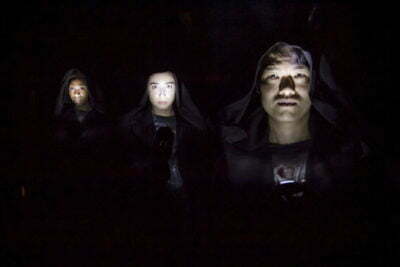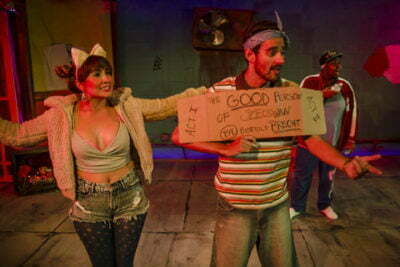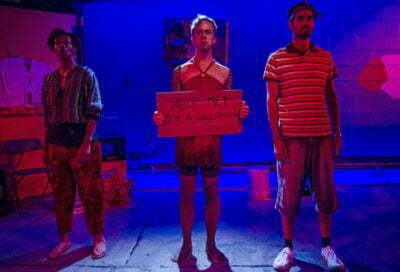The Good Person of Szechwan

By Bertolt Brecht.
Translated by Tony Kushner.
Directed by Ernie Nolan.
Produced by Cor Theatre.
Playing at A Red Orchid Theatre.
A Production Can Be Good Even If a Person Can’t.
Ernie Nolan’s production of The Good Person of Szechwan could be a pivotal point for Cor Theatre. The young company, which claims as its mission to tell stories about courage, has, for the past few seasons, presented strange pieces such as Love and Human Remains and Christina the Girl King in the Frontier space on Thorndale. But now, the company is renting A Red Orchid’s Old Town space, and presenting a fresh take on a world-famous classic. Nolan and his cast have a firm grasp on Brechtian aesthetics, and have localized the story to fit the economic malaise of Chicago’s struggling neighborhoods. The result is a play which is sure to resonate with its viewers, despite its age having changed its meaning.

Three gods are coming to visit the city in which the play takes place (Brecht himself identified it as “the capital of Sezuan” without naming it, since the play’s pseudo-Chinese locale isn’t really relevant). Wang the Waterseller (Dawn Bless) couldn’t be happier to hear of their arrival. It’s a hard world to live in, and divine assistance would be much appreciated. However, the gods are searching for someone who will provide them with hospitality as a test. The only person Wang can find who is willing to do so is Shen Te (Will Von Vogt), a prostitute who never says no. Shen Te is rewarded for her goodness with enough funds to start her own tobacco shop, which she hopes to use to better the community.

Her plan falls apart, however, when she is immediately beset by a large group of ne’er-do-well extended family members and friends-of-friends, most of whom bore some responsibility for her terrible predicament in the first place. She hardly blames them, though, since desperation makes people cruel, and she believes kindness is the solution to misery. However, in order to use money for good, she first has to make money, and the difficulties of running a business, let alone one plagued by destructive parasites before it even opens, look certain to ruin her. To gain control over her life while avoiding accountability to her peers, she invents the alternate persona Shui Ta, a hard-hearted male cousin who manages her finances. Easily fooled into believing Shen Te and Shui Ta are different people, the crowd grumblingly acquiesces, but Shen Te’s plans are again ruined when she falls in love with a man whom the Shui Ta part of her recognizes as no good for her.

As Shen Te, company member Von Vogt does the best work I’ve yet seen from him at Cor. Shen Te isn’t usually played by a man, and this casting makes clear that the Shui Ta side of the characters is just as real and vital as his feminine counterpart. But Von Vogt still plays Shen Te with the appropriate balance of caricature and kindness—her love for the manipulative pilot Sun (Chris Brickhouse) is deliberately alienating, but Brecht refused to let love be a tragic flaw. As evidenced by his early work Man Equals Man, Brecht believed very firmly that people can change quite a bit, and the transformations of Sun and Shen Te’s other admirer, the rich and brutal barber, Shu Fu (Niko Kourtis), are nothing short of inspiring.

Nolan’s twelve-member ensemble feels like a real community. When they play audio tracks of contemporary political and cultural figures, it is as though they are listening to the news along with us. Of course, it’s also a shady, gritty community that constantly sabotages itself through acts of cruelty that aren’t directly due to economic deprivation. Capitalism was to Brecht a state of mind, not just a way of doing business. Brecht also believed in using songs to illustrate his play’s points, and the most significant localization of this production is the use of rap to directly express the characters’ frustration about being transformed into base people who are hurting and hurtful. Elsewhere Tony Kushner’s translation makes the characters feel very familiar, and like Shen Te, exaggerated, without Brecht’s reliance on allusion.
When Brecht was writing The Good Person of Szechwan from 1932-1940, Europe was rife with revolutionary ideologies, and Brecht likely believed that asking the right questions of his audience would really result in actionable solutions. More than seventy years later, the only thing we’ve learned is that the people in Brecht’s time never did find any good answers to the problem of sharing resources, and that we’re still asking the same questions after all this time could make people feel despair instead of empowered. And yet, several other kinds of discrimination which Nolan’s gender-bending, multi-racial production implicitly addresses have undoubtedly gotten much better. Brecht’s line of societal interrogation hasn’t yielded the results he wanted, but it must be having some positive effect.
Recommended.
Jacob Davis.
For more information, see The Good Person of Szechwan’s page on Theatre in Chicago.
Playing at A Red Orchid Theatre, 1531 N Wells St, Chicago. Tickets are $25, with discounts for students and industry; to order, call 866-811-4111. Performances are Thursdays-Saturdays at 7:30 pm and Sundays at 3:00 pm (except August 20, at 9:00 pm) through September 11. Running time is two hours and fifteen minutes with one intermission. Intended for adults only.

